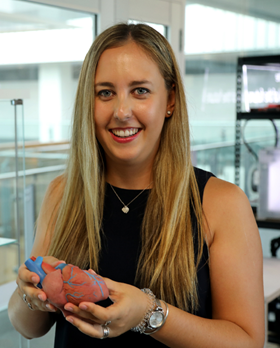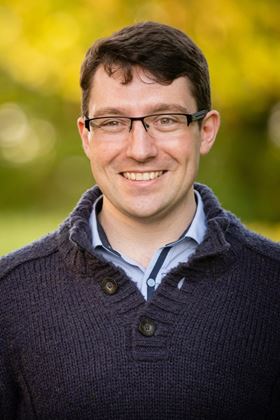About the Project:
Our main aim is to offer writing experience to early and mid-career researchers who are interested in preparing news summaries for our website. This does not involve a huge time commitment (~4 or 5 articles a year) and we are asking people from a variety of subject areas to write about any of our >100 materials journals, in whatever area or subject is most relevant to them. Contributors may select one or more articles recently published in the Materials Today extended family of journals to base their news summary article on. The news summaries are published on Materials Today.com, added to Twitter and our MT newsletter.
To view the articles written by the contributor team click here.
If you are interested in volunteering to join this team, please contact me directly l.mullen@elsevier.com.
 Dr. Leanne Mullen
Dr. Leanne MullenLeanne Mullen
PhD – Senior Publisher, Polymers, Elsevier. Leanne completed a PhD in Materials Science from the University of Cambridge. She has been working in publishing since 2012 and manages this project on MT.com. Leanne is currently Publisher of Progress in Polymer Science, Materials Today Bio, Materials Today Chemistry, Polymer, European Polymer Journal, Polymer Degradation and Stability, Reactive and Functional Polymers, Progress in Organic Coatings and Polymer Testing. Leanne’s role also involves managing both the International Conference on Multifunctional, Hybrid and Nanomaterials and the International Symposium Frontiers in Polymer Science
 Naomi Paxton (BAppSc M?AppSc MSc AFHEA)
Naomi Paxton (BAppSc M?AppSc MSc AFHEA)Naomi Paxton
Naomi Paxton is a PhD student in the Biofabrication & Tissue Morphology Group at the Queensland University of Technology, Brisbane, Australia. With a background in physics, Naomi completed the dual international Biofabrication Masters degree at QUT, Brisbane and the University of Würzburg, Germany, where she gained diverse experience in aspects of medical 3D printing for tissue engineering applications. Naomi now studies her PhD in partnership with Melbourne-based medical device company, Anatomics, through the ARC Industrial Transformation Training Centre in Additive Biomanufacturing. Her research involves combining advanced biomaterials to 3D print scaffolds for bone regeneration.
Naomi uses a range of biomaterials and composites to fabricate patient-specific surgical implants and focuses on the use of melt electrospining writing (MEW), an advanced additive manufacturing technique which allows the deposition of micron-scale fibres in ordered 3D constructs. These fibres mimic the natural extra cellular matrix within bone tissues and help facilitate cell attachment, growth and proliferation. Alongside her research, Naomi is a passionate science communicator, presenter and teacher, working as a Science, Technology, Engineering & Maths (STEM) Ambassador for two outreach programs. She regularly facilitates workshops with high school students and presents to the general public on her biofabrication research and STEM career pathways.
 Dr. Sandra Camarero-Espinosa
Dr. Sandra Camarero-EspinosaDr. Sandra Camarero-Espinosa
Sandra Camarero-Espinosa was educated at the University of the Basque Country (Spain) where she obtained her BSc. degree as Chemical Engineer and M.Sc. in Engineering of Advanced Materials. She then moved to Switzerland where she developed her doctoral studies on the generation of multi-layered biomaterial scaffolds for articular cartilage tissue engineering at the Adolphe Merkle Institute (Fribourg, Switzerland). On 2015, Sandra obtained her PhD degree in Polymer Chemistry and Bioengineering and was recognized with an award to an outstanding PhD thesis by the Swiss Chemical Society. After gaining a fellowship from the Swiss National Science Foundation, she moved to Brisbane (Australia) to work at the Australian Institute for Bioengineering and Nanotechnology. Here, she continued her research on instructive biomaterials scaffolds and their interaction with stem cells for cartilage tissue engineering. Sandra is now a post-doctoral researcher at the MERLN institute where she works on the development of instructive hierarchical biomaterial scaffolds for the regeneration of complex tissues.
Sandra’s research interests revolve around the regeneration of complex tissues. The design, synthesis, fabrication and investigation of novel hierarchical polymeric bio(nano)materials whose physicochemical properties can be tuned mimicking nature from the molecular to the macro scale, and the effect of these ones on cell phenotype and matrix deposition are the focus of her research. In particular, the spatial control of chemical and structural properties at the nanoscale that affect the overall functionality of the neo-tissue and their distribution in well-organized 3-dimensional structures.
 Jiashen Meng
Jiashen MengJiashen Meng
Mr. Jiashen Meng is now a visiting PhD student in the department of materials science and engineering at Massachusetts Institute of Technology since 2018. He is currently working toward the Ph.D degree in Wuhan University of Technology since 2015. He received his B.S. degree from Wuhan University of Technology in 2015.
His research interests cover nanoengineering, advanced materials and chemistry for highly efficient energy storage and conversion, including organic Li/Na/K battery chemistry, low-cost multi-valent rechargeable batteries as well as efficient water splitting technique and metal-air battery. Some of Mr. Meng`s publications can be found at Google Scholar (https://scholar.google.com/citations?user=Lk5PfuUAAAAJ&hl=en&oi=ao)
 Ed Darnbrough
Ed DarnbroughEd Darnbrough
Ed studied Physics with Australian study at Exeter University, spending his third year in Wollongong Australia, before moving to Bristol for his PhD on the ‘thermal stability and mechanical properties of nanocrystalline nickel’ with Professor Peter Flewitt. Ed stayed in Bristol for his first postdoctoral research post, focusing on materials for the nuclear sector, working on uranium metal corrosion with Dr Ross Springell and in conjunction with AWE. The project involved starting to investigate possible alternatives to uranium dioxide as a fuel in fission reactors. After three successful years in Bristol, Ed moved to Oxford to join the ‘Materials for Fission and Fusion Power’ group in the Materials Department as a postdoc looking at ‘Characterising radiation damage’. This allowed him to get involved in a number of projects, ranging from radiation damage in Beryllium to developing new microscale testing techniques, whilst continuing his work on uranium fuels.
Ed has extensive experience and skills in conducting in-situ and in-operando experiments on complex samples, to extract fundamental properties from small volumes. This led to his appointment as a Career Development Fellow in the field of Mechanical Properties of Battery Materials at Oxford. This is working with Professor Mauro Pasta and Professor Peter Bruce as part of the SOLBAT project.
Ed’s main research focus is on how materials and their mechanical properties evolve in working environments. This is broken down into a number of projects with focus on ‘Investigating the role of applied pressure in suppressing solid state battery failure’, ‘The mechanical properties of thin film solid electrolytes’ and ‘the volume expansion of cathode materials during charging without mechanical failure’.
 Ioanna Nakou
Ioanna NakouIoanna Nakou
Ioanna was born in Greece and completed her undergraduate studies in Chemistry at the University of Athens, undertaking a project in the division of synthetic chemistry. She then moved to Scotland where she obtained her MSc in Medicinal and Biological Chemistry at the University of Edinburgh, working on the biomimetic total synthesis of a natural alkaloid.
Ioanna commenced her PhD studies at the University of Warwick in 2017. Her research encompasses diverse aspects of chemistry and biology of natural products, including understanding the mechanisms for natural product biosynthesis, investigating their biological activity, exploring protein-protein interactions of biosynthetic systems and employing biosynthetic engineering approaches towards the production of novel natural product derivatives.
 Muhammed Maktari
Muhammed MaktariMuhammed Maktari
Muhammed graduated from Imperial College London with an MEng in Materials Science and Engineering in 2018 with a focus on Biomaterials and Tissue Engineering. He is currently in his first year of a PhD in the Department of Materials Imperial College London. His research focuses on the development of advanced wound healing solutions for chronic wounds and he is currently exploring the use of collagen and honey as a bio-active wound dressing for the treatment of hard to heal wounds such as burns and diabetic ulcers. Alongside traditional materials characterization methods, he also employ interdisciplinary techniques to assess the viability of my materials in terms of degradation and cell interaction.
 Raquel Costa Alemdia
Raquel Costa AlemdiaRaquel Costa Almeida
Raquel Costa Almeida holds a BSc degree in Biology (2011) and a Master degree in Biomedical Engineering (2013) from the University of Porto (PT). She obtained a PhD degree in Bioengineering (MIT Portugal Program) in December 2017 from the University of Minho (PT) under the supervision of Prof. Manuela E. Gomes, in collaboration with Harvard-MIT Division of Health Sciences & Technology (USA) under the co-supervision of Prof. Ali Khademhosseini. Raquel Costa Almeida belongs to the 3B’s Research Group from the University of Minho, where she is Post-Doctoral researcher. She has been exploiting fiber-based techniques for tendon and tendon-to-bone tissue engineering and regeneration and working on the establishment of co-culture systems as platforms to study tenogenic differentiation of stem cells. In such a short career, Raquel was elected SYIS member of the Communications & Outreach Committee of the European chapter of Tissue Engineering and Regenerative Medicine Society (TERMIS-EU)
 Dr. Xingcai Zhang
Dr. Xingcai ZhangDr. Xingcai Zhang
Dr. Xingcai Zhang expertise includes chemistry, nanomaterials, bionanomedicine, nanotea, natural products, lab/organ on-a-chip, carbon/polymer/natural/functional/ two-dimensional materials for biomed/catalysis/absoption/energy applications. Dr. Zhang serves as an Associate Editor for a Springer Nature journal, a Nature Nano Ambassador, and an Advisory Board Member for Wiley and World Tea Organization.
Dr. Zhang is a science writer for Elsevier Materials Today, Nature, and Royal Society of Chemistry. Some of Dr. Zhang`s publications can be found at: http://orcid.org/0000-0001-7114-1095 and Google Scholar.

Sinem Tas
Sinem Tas received her Ph.D. Degree (2016) from the University of Twente, The Netherlands working on “Bio-inspired ion-selective polymeric membranes". She joined Prof. Julius Vancso’s group (the University of Twente, The Netherlands) as a postdoctoral researcher to work on polymer brush-based sensors. Currently, she is a Marie Curie Cofund/European Respiratory Society (ERS) RESPIRE 3 fellow at Dr. Darcy Wagner’s lab in Lund University, Sweden. Her recent research focuses on 3D bioprinting of smart hydrogels for lung bioengineering.
Justine Delage
Justine has graduated from both ENSCI (école nationale supérieure de céramiques industrielles), in Limoges, France, an engineering school specialising in ceramics materials and ENSMA (école nationale supérieure de mécanique et d’aérotechnique), in Poitiers, specialising in aeronautics. She also has a master’s degree in High Performance Material from ENSMA. She completed her end-of-studies internship at Safran on the development of Laser Metal Deposition process of nickel-based superalloys.
Justine joined Imperial College London in December 2017 as a PhD student in the Department of Material in the Centre for Advanced Structural Ceramics (CASC). Her PhD project is in partnership with Rolls Royce and deals with the evaluation of the fracture toughness and the fracture mechanism of SiC-based Ceramics Matrix Composites. Her research focuses on fracture behaviour characterisation by means of in-situ and ex-situ mechanical tests such as tensile and bending tests, coupled with damage evaluation characterisation such electrical resistivity measurement, acoustic emission measurement and digital image correlation.